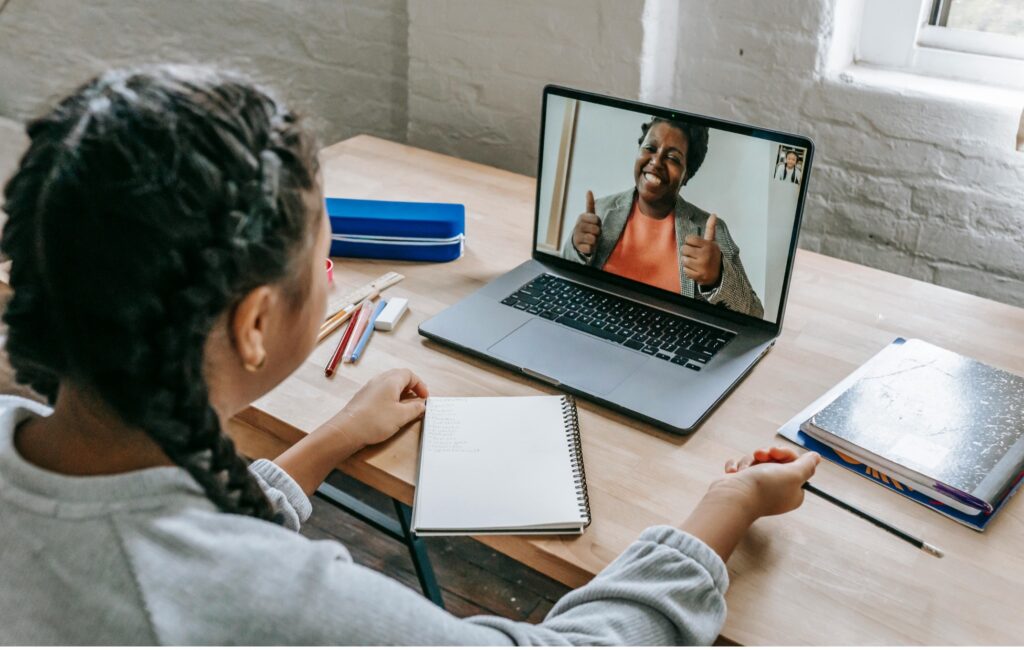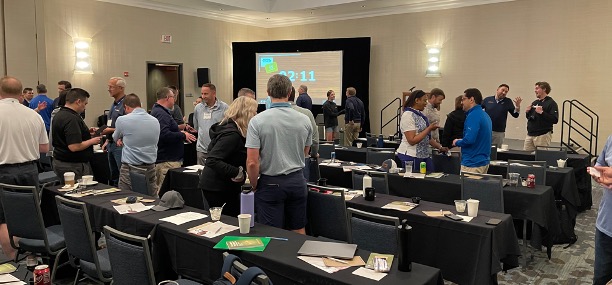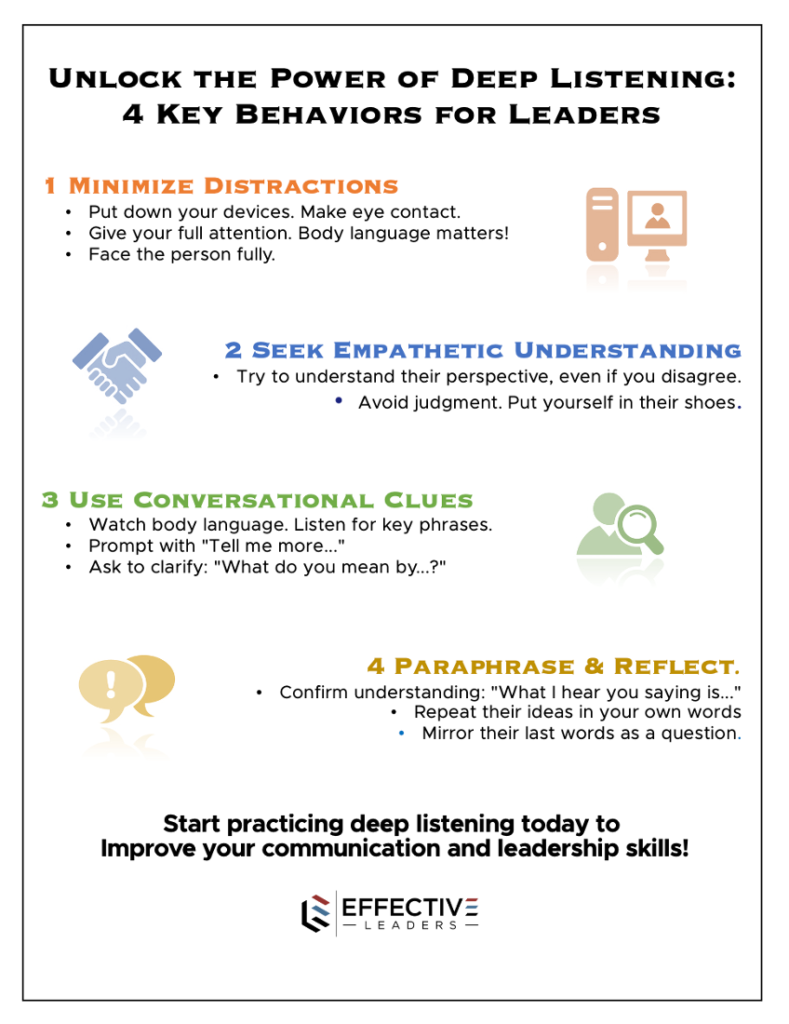Deep listening is a game-changer for Effective Leadership and improved team dynamics.
This essential skill not only strengthens relationships, but also drives productivity within your team.
Leaders who master deep listening can create a culture of trust and collaboration, leading to more engaged employees and satisfied clients.
Here’s how you can make deep listening a cornerstone of your leadership style and reap tangible benefits for your organization.

1. Start with Empathy: Understand Before Responding
The most effective leaders know that understanding their team’s perspectives is crucial. Empathy, the foundation of deep listening, requires you to genuinely care about what your team members are saying. Instead of formulating your response while they are speaking, focus entirely on their words, tone, and body language.
Why It Matters:
Empathy builds trust and respect. When team members feel heard, they are more likely to be open and honest, fostering a more transparent and cohesive work environment. This trust translates into higher employee morale and retention, as individuals are more committed to a leader who values their input.
Action Steps:
~Dedicate time in team meetings for open dialogue.
~Practice active listening techniques, such as nodding and summarizing what you’ve heard.
~Avoid interrupting and give your team space to express themselves fully.
2. Foster an Inclusive Culture: Encourage Diverse Voices
Inclusion is a critical aspect of deep listening. As a leader, you must ensure that every team member feels valued and heard, regardless of their role or background. Encouraging diverse perspectives can lead to more innovative solutions and a richer organizational culture.
Why It Matters:
Diverse teams are proven to outperform homogeneous ones, thanks to their varied viewpoints and approaches to problem-solving. When leaders actively listen to and incorporate diverse opinions, they not only enhance creativity but also prevent groupthink, where critical thinking is overshadowed by a desire for consensus.
Action Steps:
~Create forums for team members to share their ideas, such as suggestion boxes.
~Recognize and celebrate contributions from all team members, not just the most vocal ones.
~Implement policies that promote diversity and inclusion in the workplace.
3. Enhance Client Relationships by Understanding Needs
Deep listening extends beyond internal team interactions; it’s equally crucial for building strong client relationships. By actively listening to clients, leaders can better understand their needs and expectations, leading to more tailored and effective solutions.
Why It Matters:
Clients who feel heard are more likely to be satisfied and loyal. This satisfaction can lead to repeat business, positive referrals, and a stronger reputation in the marketplace. Understanding client needs also enables leaders to anticipate issues and innovate proactively, staying ahead of competitors.
Action Steps:
~Schedule regular check-ins with clients to gather feedback.
~Use open-ended questions to explore their needs and concerns in depth.
~Reflect back what you’ve heard to ensure accurate understanding before proposing solutions.
4. Strengthen Decision-Making: Gather Comprehensive Insights
Effective decision-making hinges on having a complete understanding of the situation at hand. By practicing deep listening, leaders can gather a wide range of insights from their team, leading to more informed and balanced decisions.
Why It Matters:
Decisions made with input from diverse perspectives are often more robust and sustainable. Deep listening ensures that potential risks and opportunities are thoroughly considered, reducing the likelihood of oversight and enhancing strategic planning.
Action Steps:
~Solicit input from various stakeholders before making key decisions.
~Encourage team members to voice their opinions and concerns.
~Analyze feedback thoroughly and consider all angles before finalizing decisions.
5. Boost Team Collaboration. and More Open Communication
For a team to function effectively, open and honest communication is essential. Leaders who listen deeply can identify and address communication barriers, creating an environment where team members feel safe to share their thoughts and ideas.
Why It Matters:
A culture of open communication leads to better collaboration and problem-solving. When team members feel comfortable speaking up, they are more likely to collaborate effectively, share valuable insights, and support one another, enhancing overall team performance.
Action Steps:
~Model open communication by sharing your own thoughts and encouraging feedback.
~Facilitate regular team-building activities to strengthen interpersonal relationships.
~Address communication issues promptly and constructively, ensuring a positive and supportive atmosphere.

4 Key Behaviors to Develop the Skill of Deep Listening
Whether in-person or remotely, you can practice and improve your deep listening skills as a leader by focusing on four key behaviors in your conversations…
– Remove distractions and look at the person.
Put down your device of choice, make eye contact and give someone your complete attention. What message does it send to your team, let alone the person you’re talking to, if they sense you’re just not that into it? Give them your eyes, and be sure that your shoulders and feet are also in their direction instead of away from them.
– Seek to understand without judging.
You can’t listen to understand, especially if you notice you are already crafting your response, or jumping to judgement mode. Truly empathetic listening cannot occur if you are positional. Seek to understand this person’s frame of reference. Put yourself in their shoes… especially if you disagree or have a different perspective.
– Look for key conversational clues
Watch their body language, word choice, or key phrases that are opportunities to dive deeper. Phrases like “Tell me more about that…” and “What do you mean when you say…” should be part of your regular conversational repertoire. When we listen in this way, people feel seen and heard and perform at their best.
– Become an expert at paraphrasing and repeating.
As well as letting the other person know you have given them the courtesy of your attention, it’s an excellent mechanism for avoiding assumptions – and miscommunication. Repeat their ideas in your own words with a phrase like “what I hear you saying is _____ – is that right?” And you can encourage them to go further and deeper in their own sharing by mirroring their last word or two as a question…

Deep listening is more than just a skill…
It’s a strategic advantage that can transform your leadership and drive organizational success.
By embracing empathy, fostering inclusion, enhancing client relationships, strengthening decision-making, and boosting team collaboration, leaders can create a culture of trust and innovation.
To elevate your leadership and team dynamics further, consider engaging Sean Glaze as your next professional development speaker or team building event facilitator. With his expertise and interactive approach, Sean can help your team master deep listening and achieve remarkable results. Contact Sean Glaze today to make your next professional development day a memorable and impactful success.
For a team to function effectively, open and honest communication is essential.
Leaders who listen deeply can identify and address communication barriers, creating an environment where team members feel safe to share their thoughts and ideas.
– – – – –

Sean Glaze is a leadership speaker, teambuilding facilitator, and author who delivers engaging experiences that ignite your team’s performance. Sean has worked with clients like Cisco, John Deere, the CDC, and Emory University to increase collaboration, boost productivity, and build more positive and profitable workplace cultures.
As a successful basketball coach, Sean gained valuable insights on turning talent into teamwork – and now he travels around the country to share those lessons. Sean’s conference keynotes and custom team building events deliver laugh-out-loud moments and memorable take-aways that transform your people into winning teammates and more effective leaders.
Sean’s books, Rapid Teamwork, The 10 Commandments of Winning Teammates, and Staying Coachable are entertaining parables that help accelerate the growth of leaders and their teams!

Use Connection Chats to Engineer Better Collaboration Across Every Division on Your Team

Effective Leaders Build Trust and Teamwork by Focusing on Leadership Development

The Power of a Sticky Culture in Boosting Organizational Performance and Retention

Are Your Team Standards Seen as Suggestions or Recognized as Requirements?
Books and Resources for Leaders
Check other blog
Use Connection Chats to Engineer Better Collaboration Across Every Division on Your Team
Effective Leaders Build Trust and Teamwork by Focusing on Leadership Development
The Power of a Sticky Culture in Boosting Organizational Performance and Retention
Contact Sean

Connect with Sean

Tell Sean About
Your Event
Tell Sean About
Your Event
"*" indicates required fields












